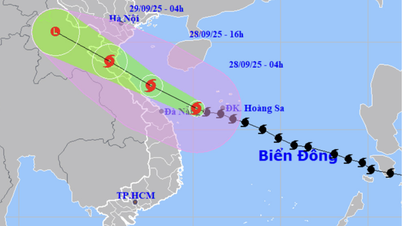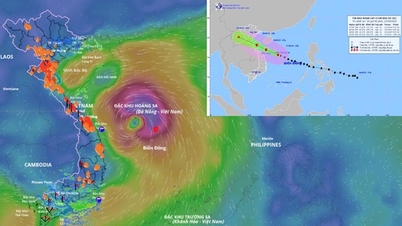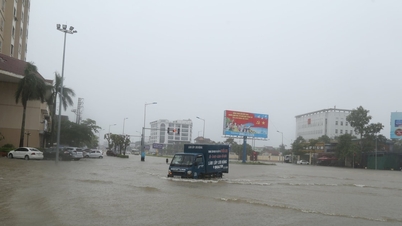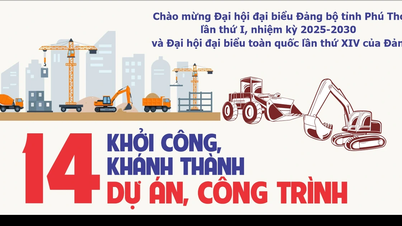In the latest draft of the revised Personal Income Tax Law, the Ministry of Finance submitted to the Government a minimum tax rate of 5% corresponding to taxable income in a month of 10 million VND (after deducting family circumstances and other taxable expenses). The maximum tax rate is 35%, with taxable income from 100 million VND. The progressive tax rate is shortened from 7 levels to 5 levels.
Proposal to raise the tax threshold
The drafting agency believes that adjusting the tax bracket will reduce the tax rate - the tax payment rate on total income. This will help taxpayers, especially those with average and low incomes, to move to the status of not having to pay personal income tax. Meanwhile, the tax rate for those with higher incomes will also decrease compared to the current level.
For example, an individual with one dependent, income from salary and wages of 20 million VND/month, the current tax rate is 125,000 VND/month. After implementing family deductions and tax schedule according to the proposed plan, no tax will be payable.
For those earning 25 million VND/month, the tax payable is reduced from 448,000 VND to 34,000 VND/month, a reduction of 92%. Similarly, those earning 30 million VND will have their tax payable reduced by 73% in the month.
According to the Ministry of Finance, tax regulation is also aimed at the upper middle income group.
Specifically, the 5% tax rate at level 1 applies to taxable income of 0-10 million VND, equivalent to income from salary and wages of an individual or a dependent of 20-35 million VND. The tax rate at level 2 applies to taxable income of 10-30 million VND, equivalent to income of 35-56 million VND...
Regarding budget revenue, the Ministry of Finance calculated the revenue reduction to be 8,740 billion VND.
The Personal Income Tax Law divides income into 7 levels, with progressive taxation applied to each part. The 35% rate is for those with income over 80 million VND per month, set since 2009. Many opinions previously said that this tax rate was too high, even eliminating the efforts to increase income of the group of people with average and good income.
Ms. Ngoc Giang, 35 years old, working at a Swedish logistics company, said she is willing to tighten her income so that her personal income tax rate only reaches the maximum threshold of 30%. This is not only a personal financial problem but also a way for her to have the opportunity to balance her personal life.
According to the current principle, high income must pay higher taxes, so if you try hard to increase your income, you will be "jumped" in the tax bracket. If you try to work more and then have to pay higher taxes, then according to Ms. Giang, you can maintain the current level and spend time on your personal life.

Workers buy goods at traditional markets (Photo: Huu Khoa).
Nguyen Quang Huy, CEO of the Faculty of Finance and Banking, Nguyen Trai University, assessed that the reduction to 5 levels is a step forward in reforming the tax system.
He believes that fewer levels make it easier for people to understand and predict the amount of tax they have to pay. A clear tax system reduces “compliance costs” and “psychological costs”. When workers and businesses understand the regulations, they will proactively calculate and declare more honestly, instead of trying to avoid them. This is an important factor to increase sustainable budget revenue without tightening measures.
Stretching the gap between tax brackets, especially at income thresholds of 30-100 million VND/month, also creates "breathing space" for workers to work hard without worrying about being taxed too soon.
“This is a more suitable approach in the context of Vietnam needing to encourage the expansion of the middle class, thereby increasing the consumption and accumulation power of the economy . However, to ensure fairness, the very high income group still needs to be subject to stronger regulation,” he said.
However, Mr. Huy also said that it is necessary to re-evaluate the tax threshold, because the current level of 10 million VND/month does not keep up with the cost of living in urban areas. "It is possible to raise the threshold to 12-15 million VND/month to reduce tax pressure on low-income people, and at the same time consider a mechanism for periodic adjustment according to CPI," he suggested.
Maximum tax rate 35%: Tax threshold may be raised
The Ministry of Finance's draft proposes a maximum tax rate of 35%, with taxable income over 100 million VND. However, this highest tax rate of 35% leads to the reality that some individuals have to pay tax up to 30% of their income. This means that many people with good incomes, but not the super-rich, are still subject to the highest tax rate.
Some opinions say that the maximum tax rate should only be 20-25% in the context of Vietnam's low average income and the need to motivate workers.
Mr. Nguyen Van Duoc, General Director of Trong Tin Accounting and Tax Consulting Company Limited, said that taxable income at 35% should be raised to the threshold of 120-150 million VND.
He believes that the maximum tax rate should not be reduced to 20-25% because it will cause a huge budget deficit. Personal income tax is the third highest source of revenue in the tax system, after VAT and corporate income. In some countries, the highest tax rate is still set at 35% (Thailand, Indonesia, Philippines), and in some countries, it is even higher than 45% (China, Korea, Japan, India)...
In addition, according to Mr. Nguyen Van Duoc, in the plan to amend the personal income tax table that the Ministry of Finance is submitting, it is necessary to further expand the first and second levels to reduce the tax burden for the middle-income group. At the same time, the drafting agency can consider removing the 25% tax rate and adjusting it in the direction of "jumping" from 20% to 30%.
This approach will help the income of high-income groups compensate for the tax gap at low levels, increasing budget revenue while ensuring fairness and reasonableness of tax policy.
Regulations on family deduction levels: Need specific criteria
Currently, the family deduction for individual taxpayers is 11 million VND and the deduction for each dependent is 4.4 million VND, maintained from July 2020. Of which, the level of 11 million VND is determined by the tax authority as the level of spending to meet the minimum living needs of a person, and 4.4 million VND is determined as 40% of the deduction for the taxpayer himself.
The Personal Income Tax Law took effect in 2007, and the family deduction was adjusted in 2013 and 2020. According to regulations, when the consumer price index (CPI) fluctuates above 20%, the Government will submit to the National Assembly Standing Committee an adjustment to this deduction.
In fact, many opinions say that this family deduction is outdated and inappropriate in calculating personal income tax when spending and life are increasingly expensive.
Tax expert Dr. Nguyen Ngoc Tu assessed that the personal income tax policy, including calculating family deductions, has long shown many shortcomings. The current family deduction for employees is 11 million VND/month, and for dependents is 4.4 million VND/month, applied nationwide, regardless of region. According to him, this "leveling", is a disadvantage for employees when calculating personal income tax.
"In recent years, prices have fluctuated a lot. If we consider only essential expenses related to taxpayers' lives such as electricity, water, gasoline, healthcare, education, house rent, bank loan interest, etc., the costs have all increased, eroding taxpayers' real income. The current family deduction level needs to be amended and supplemented urgently. It is necessary to develop a flexible and appropriate policy," Mr. Tu said.

Workers select items for sale (Photo: Huu Khoa).
However, in this draft, the fixed deduction level is not included in the law. Instead, the Ministry of Finance proposes that the Government regulate the family deduction level to ensure flexibility and proactive adjustment in accordance with the reality and requirements of socio-economic development in each period.
At the same time, the Ministry proposed to add other specific deductions before calculating tax for individual taxpayers.
Specifically, taxpayers are allowed to deduct from their pre-tax income the expenses for health care, education and training of taxpayers and their dependents. The scope and level of deductible expenses will be considered and calculated appropriately so as not to reduce the role of personal income tax policy as an income regulation tool.
After deducting family deductions and other taxable expenses, taxpayers will be subject to progressive tax rates.
According to Mr. Nguyen Van Duoc, the Ministry of Finance proposed to assign the Government to regulate the family deduction level, but there must be specific criteria and cannot be assigned to the Government to regulate completely. “The Government should guide the policy to be more flexible but it should not be assigned to the Government but there must be criteria to ensure supervision and law enforcement…”, he said.
According to him, there needs to be a specific calculation method. “I think we should rely on CPI combined with other indicators such as GDP, basic salary…”, he suggested.
The Ministry of Finance has proposed an amended Law on Personal Income Tax, which is expected to be approved by the National Assembly at its session in October and take effect from July 1, 2026.
The family deduction level will be implemented according to the resolution of the National Assembly Standing Committee, expected to be submitted by the Government in October. The new deduction level will be applied until this resolution expires and the Government stipulates a replacement family deduction level.
Source: https://dantri.com.vn/kinh-doanh/chuyen-gia-nen-nang-nguong-thu-nhap-chiu-thue-35-len-120-150-trieu-dong-20250906012124322.htm







































![[Photo] Soldiers guard the fire and protect the forest](https://vphoto.vietnam.vn/thumb/1200x675/vietnam/resource/IMAGE/2025/9/27/7cab6a2afcf543558a98f4d87e9aaf95)































































Comment (0)